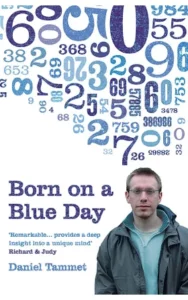Numbers are my friends, and they are always around me. Each one is unique and has its own personality. The number 11 is friendly and 5 is loud, whereas 4 is both shy and quiet – it’s my favourite number, perhaps because it reminds me of myself. Some are big – 23, 667, 1, 179 – while others are small: 6, 13, 581. Some are beautiful, like 333 and some are ugly, like 289. To me, every number is special.
Daniel Tammet is an autistic savant, which means very, very, very clever. He can calculate, memorize and manipulate numbers in utterly amazing ways, and because he has synesthesia – which he describes as a ‘rare neurological mixing of the senses’ – neurological ‘crossed wires’ – he experiences them as colours, shapes, textures, contours, motions and moods. For instance, 1 is ‘a brilliant and bright white, like someone shining a flashlight into my eyes’. 37 is like porridge. 89 is falling snow.
Books on autism and neurodivergence are ‘in’ at present, and since imprints don’t publish what they can’t sell, this indicates an appetite among readers for updated information and more first-person accounts which talk of difference rather than disability. I had wanted to read Tammet’s Nine Minds, which came out last year to good reviews, but the library hasn’t got it (yet?). But I was surprised to find an earlier book, Born on a Blue Day, in the catalogue. It was published in 2006 when he was 27, and went on to become a best-seller and prize-winner. When I looked him up on the net, I discovered that he’s famous, subject of a couple of documentaries, a TED talker and has written lots of other books. There’s so much I don’t know about…well, everything!
Born on a Blue Day is written in clear and straightforward prose, very readable except when he gets onto numbers. I’m not like Tammet; numbers are not my friends. Instead, they’re old enemies. They inflicted horrible mental strain and confusion and despair in school. Even now, just looking at a Sudoku makes my brain scramble – but when the numbers are attached to something tangible, like a bank balance or tax or a budget, I can happily sit down with a calculator.
Tammet describes his childhood and adolescence as a time of not fitting in, out of step with his peers, struggling and at times suffering. One of the most poignant and moving episodes was Daniel’s first experience of falling in love. He had figured out that he was gay – he became attracted to another young man – he tried to ‘court’ him by doing his schoolwork for him – and finally wrote him a letter telling him how he felt. I think my heart rate must have gone sky-high at this point, because I was expecting a hideous exposure and subsequent outing/humiliation/ostracism/bullying…but the young man wrote back sensitively, telling Daniel that he couldn’t be the person he wanted him to be. So he was let down gently, thank goodness.
Tammet comes across as likeable and genuine; a good, kind man who happens to be born with a profoundly different brain to most of us. He’s used his superpowers for good – making himself available to scientists as a subject, communicating about autism in his books, even at one point reciting the number pi to the 22,514th digit to raise money for an epilepsy charity. It was heartwarming to discover that he was, at the time of writing Born on a Blue Day, in a long-term relationship and had found in Christian faith a sustaining force in his life.

